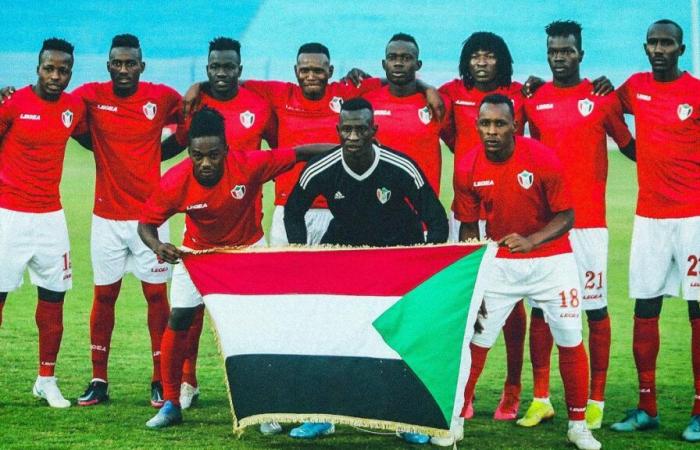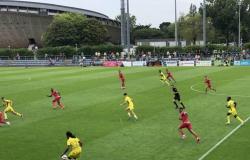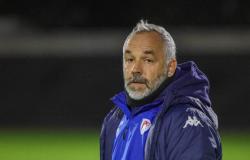Nile Crocodiles have bite. Currently second in Group F of the 2025 Africa Cup of Nations qualifiers, the team coached by Kwesi Appiah is impressing. In a difficult group with Angola, Ghana and Niger, Sudan was able to do well. After 4 matches, the Sudanese are currently second with five points ahead of Ghana and six over Niger. Taking on Niger (1-0) before falling to Angola (2-1), Sudan had an excellent October international break. Managing to hold a draw (0-0) against Ghana in Accra, the Sudanese won the return match at the Benina Martyrs Stadium in Libya for a victory (2-0). Now in a strong position to qualify with a trip to Niger this Thursday, Sudan only needs a point or a poor performance from Ghana to qualify.
The rest after this ad
The Falcons of Jediane have a golden opportunity to offer themselves a nice blow with their 10th participation in the African Cup of Nations. Because yes, Sudan is not necessarily a small African nation, but rather a sleeping giant. Participating in the first edition in 1957 then finalist in 1959 and 1963, Sudan won the 1970 edition… against Ghana (1-0). More successful than other major African nations such as Mali and Burkina Faso, Sudan has a coronation in the same way as Morocco, Tunisia or Senegal. However, his footballing history became more complicated little by little. Since 1976, Sudan will have experienced a long journey through the desert until 2008. A 32-year wait which will be followed by elimination in the first round as in 2021 during the last Sudanese participation. The last outburst being a quarter-final snatched during the CAN 2012. One of the reasons for this downgrading of Sudan for many years is its geopolitical situation. Indeed, since 1955, shortly before the country's independence, the country has been disrupted by civil war and the latter is still ongoing.
Sudan scarred by war
Torn between the northern part of the country with a Muslim majority and the southern part which is Christian and animist, Sudan saw the situation degenerate as the country approached independence. The southern part of the country launched an insurgency to secede in 1955 and the movement gathered pace in the 1960s until South Sudan gained partial autonomy. This conflict will have caused between 500,000 and 1 million deaths. The Football team won the African Cup of Nations in 1970, just before the end of this first civil war. After eleven “slightly calmer” years, the Second Sudanese Civil War began in 1983 and lasted until 2005. A conflict lasting more than 20 years which left 2 million dead and more than 4 million refugees, i.e. one of the conflicts with the most victims since the Second World War. Marked by terrible abuses, massacres, slavery and racism between the North and the South of the country, this human catastrophe will have torn Sudan even further apart.
The rest after this ad
While the War in Darfur between 2003 and 2020 also negatively impacted a country that did not need it and will increase the human toll in deaths (around 300,000) and refugees (2.7 million), Sudan is still hit by the war. It should also be noted that Sudan and South Sudan are no longer the same country since on July 9, 2011, South Sudan seceded following a referendum which was held months before. Since April 2023, a fourth civil war called the Generals' War has hit the country which will celebrate 80 years of conflict and instability next year. A battered country, Sudan therefore has much more important issues to deal with and football remains secondary to the daily situation of many inhabitants. However, despite this, Sudan is experiencing a new golden age after that of the late 1950s to the mid-1970s and the period 2008-2012 when the country was able to raise its head above water.
No more championship and a talent drain
If Sudanese football has experienced long slumps, its championship is not ridiculous. Ninth best in Africa, it provides a solid level on a continental scale. Al Hilal Omdurman club reached two African Champions League finals (1987 and 1992) while the country's second biggest club, Al Merreikh reached the Confederation Cup final in 2007. However, the championship has been stopped since the 2023 conflict and the two main clubs, Al Hilal and Al Merreikh, are currently playing in the Mauritanian championship. This season Al Hilal is also leader when Al Merreikh is eleventh, but with three matches less. Sudan was also twice third in the African Nations Championship in 2011 and 2018, a competition which only brings together players playing in Africa. With some references at the local level, but little confirmation at the selection level, Sudanese football suffers greatly from its environment.
The rest after this ad
Moreover, Sudanese players have difficulty exporting outside the continent. In the current list, only Sheddy Barglan who plays in Dutch D2 at FC Den Bosch plays in Europe. Striker Abo Eisa plays in Thailand at Nongbua while his brother Mo Eisa plays in Iran at FC Nassaji Mazandaran. All the others, however, are in Africa. Saif Thierry plays in Egypt at Pharco FC while the duo Bakhit Khamis and Al-Gozoli Nooh at Al-Ahli in Libya. Abdelrahman Kuku, John Mano and Eid Mugadam are also in Libya at Al-Ittihad, Al-Ahli Benghazi and Al-Nasr Benghazi. Still in Libya at Asswehly SC, we find Mustafa Karshom and Ahmed Al-Tash. Mohamed Mustafa plays in Tanzania at Azam FC. However, the numerous conflicts that have affected the country have deprived it of part of its diaspora. Formerly of Benfica and Salzburg, the German Hany Mukhtar who plays in Nashville and who was an U21 international with Germany could have enjoyed star status in Sudan. The situation is similar for Meshaal Barsham, Almoez Ali and Abdelkarim Hassan who won the Asian Cup with Qatar and could have been strong reinforcements on the African scene.
Football to fight the war
However, despite its outsider status, Sudan has managed to surprise everyone and wants to move mountains again. “I like our team because we are not afraid of anyone and we don't think about the other team. It doesn't matter if they have Neymar, Ronaldo or Jordan Ayew, we only think about ourselves. We are brave and we have so much heart» said Abdelrahman Kuku in an interview for The Guardian. The one who was born in Egypt before living in Australia and the United States ultimately opted for the selection of his origins. He found a united group which has been performing well since the arrival of James Kwesi Appiah in September 2023. The latter who was at the head of Ghana three times (4th CAN 2013, 2014 World Cup group stage and 1/8th CAN 2019 final) was able to shape a formidable team which played a dirty trick on its country of origin.
The rest after this ad
«Beating Ghana was a very good thing, not only for us and the country, but also for the coach. He was their head coach, but they fired him. Ghana underestimated us a lot. When we played them in Ghana, we faced a lot of difficulties, but we played to our strengths. They thought we were lucky and it would be the same in Benghazi, but we won » underlines Abdelrahman Kuku. The latter also explains that the difficult situation in their country provides motivation for the Sudanese team: “war moves the team forward. This is a big boost for us, knowing that we are practically the only reason people are happy in Sudan. When we play, that's all that's going on in the country. The war stops for 90 minutes while everyone watches, there is no fighting.»
One point away from qualifying for the 2025 Africa Cup of Nations, Sudan can do even crazier. During the qualifiers for the 2026 World Cup, the Nile Crocodiles impressed Hooked by Togo (1-1), they then beat DR Congo (1-0), Mauritania (2-0) and the historic rival , South Sudan (3-0). Leader of its group with two points ahead of Senegal and three over DR Congo, Sudan has its destiny in hand. Enough to envisage a happy ending to the story. “It's something we talk about. Even our coach says that if we participate in the World Cup, it will end the war. Just look at what Drogba did. Football is much more than just a game. It has brought people together in Ivory Coast and we hope it will help end the war» supported Abdelrahman Kuku. In the process of writing one of the most beautiful pages in its history, Sudanese football is showing that even in the worst horrors, beautiful things can be born and bring hope for a sweeter tomorrow…
Pub. the 13/11/2024 21:07
– UPDATE 14/11/2024 01:52






